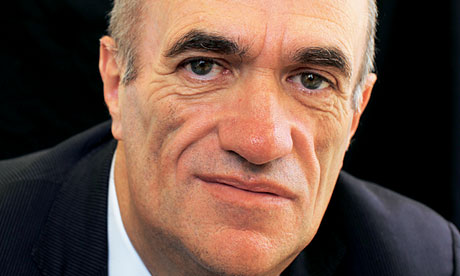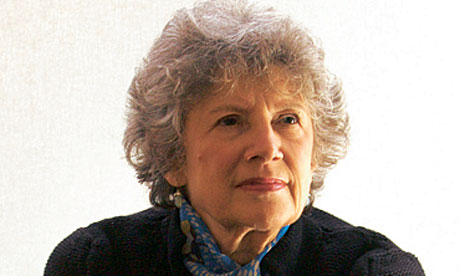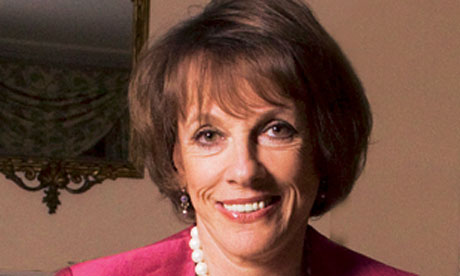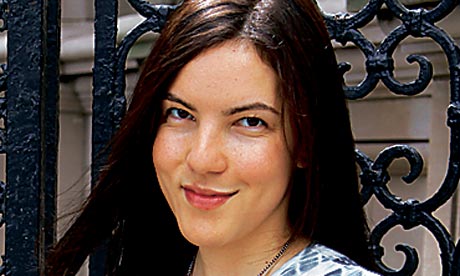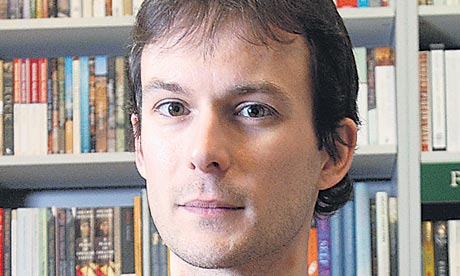
'It is actually
exceedingly difficult in much of the world for women to achieve highly
in a career while also having a thriving family and personal life.'
Photograph: Aping Vision/STS/Getty Images
Are we living in a post-familial age? According to a new report, The Rise of Post-Familialism: Humanity's Future?,
the answer is yes: the traditional family unit is slowly dying out as
more people choose to forgo children and even marriage. As a result,
society is economically imperilled, lacking the necessary workforce to
support older generations. We're also "values-challenged", entering a
brave new world of materialistic indulgence, selfishness and protracted
adolescence.
Sounds awful, doesn't it? Luckily, almost none of it is true.
People around the world are indeed delaying childbearing and marriage, and larger numbers of people never marry or reproduce at all. But that is not synonymous with a moral decline, or selfish decadence. It represents an uptick in women's rights, a commitment to creating the family one wants, and wider choices for everyone.
It's no shock that the drop in the number of children a woman has came along with the advent of the birth control pill. The countries with the highest birth rates aren't just highly religious; they're poor, have abominable human rights records and lack access to reliable birth control. Contrary to New York Times columnist Ross Douthat's position, it is not in fact the country with the most babies that wins: if that was the case, Nigeria would be running the show.
Despite the clear correlation between reproductive rights and prosperity, the report's author, joined by conservative commentators, laments the decline in childbearing because, as David Brooks says, it represents a rise of individualism and personal freedom – and that's a bad thing. Brooks writes:
Valuing tradition, family and God doesn't automatically translate into healthy families or economic prosperity. Just look at the United States: the states that most idealise the conservative model do have higher birth rates, earlier marriage, higher levels of religiosity and more consistent church attendance. They make up consistent conservative voting blocks. They also have the highest levels of divorce in the country, the highest poverty rates, the highest teen pregnancy rates, the lowest child health ratings and the lowest education levels. On the other hand, the states that champion "liberal values" do have later marriage rates and lower birth rates. They're also richer and better educated, the children that reside in them are healthier and families split up less often.
And contrary to the assertions in both the report and the commentary surrounding it, a lower birth rate does not actually mean that individuals end up voting to support only the interests of affluent childless singles. Quite the opposite: the social safety net is much stronger in liberal, supposedly individualistic, lower-birthrate blue states. An array of choices seems to mean that people respect and support a variety of paths.
The rest of the world tells a similar story. There are obviously myriad complex factors that play into a nation's success, but the places where people are the healthiest and the most economically stable are the relatively liberal nations that provide for social welfare while allowing many different models of family to flourish.
Meanwhile, the arguments in favour of a return to the traditional family remain unconvincing, and even insulting. For example, NYT columnist Ross Douthat accuses single people of being "decadent" in their selfish singledom (an argument neatly taken down by Ann Friedman). In the report itself, the authors project a nobility on to staying at home and "sacrificing" for one's family, as opposed to young people who show "an almost defiant individualism" and "indulge themselves in hobbies, fashion or restaurants". Singapore pastor Andrew Ong says that the child-free media culture is "about not growing up".
Listening to these guys, you would think that kids are an awful drag, that raising a family requires (almost entirely female) sacrifice, and that such hardship simply must be endured for … something they don't quite specify. By contrast, they seem to think that single people are in a perpetual adolescence, out partying, eating and drinking until, I suppose, we get ours by dying alone with our cats.
That's not making much of a case for marriage and babies, is it?
In reality, most of these selfish singles are in fact eventually getting married and having babies. They're just doing it later. The result is that these selfish late procreators are wealthier, their marriages last longer and their kids are healthier. How awful.
Investing in future generations is crucial, but conservatives seem to value not so much investment as major personal sacrifice in the here-and-now that results in poorer outcomes for everyone involved. And for what? So that future generations can grow up to sacrifice themselves too? Feminists and other liberals aren't against supporting children and making the world a better place. We just realise that the best way to do that isn't by making ourselves collectively miserable, but by actually taking steps to improve society for everyone, now and later.
One of the ways we're doing that is by making it easier for women to choose to have children. Demanding that women sacrifice everything for child-rearing isn't exactly getting the young ladies to line up, but that's what our current employment model is based upon. It is actually exceedingly difficult in much of the world for women to achieve highly in a career while also having a thriving family and personal life. Our current employment model is based on a family economy with a male partner who is able to work full time, and a female partner who stays at home and tends to the children. Women are now in the workforce in unprecedented numbers – but the workforce hasn't adjusted to give people much time for anything other than work. And conservatives have championed this model, praising folks who do multiple jobs just to make ends meet or work 80 hours a week. High-achieving men still often have wives who stay home. What happens, then, is high-achieving women either "opt out" and let their husbands do the bread-winning, don't get married or decide that they want to have kids later or not at all. And the economy suffers for it.
But young single people don't just want to slave away at work all day, and we don't have someone at home taking care of the rest of our lives. We also want a work-life balance. We may not be going home to children, but we want to pursue our hobbies, spend time with the families we've created and engage with our communities. We realise there is much more to life than just work – but we also think there's much more to life than a traditional family.
That kind of push-back could be the key in making work-life balance a reality. Historically, women's work has been undervalued and disrespected. One reason "work-life balance" is discussed but not actually executed is because, I suspect, it's women – and the most disrespected and undervalued group of women, mothers – who that balance is perceived to benefit. So what if this new group of highly effective, highly motivated, hard-working young single people are now demanding more balance and reasonable work hours and leave policies? Everyone benefits.
Women today also want relationships that are mutually supportive and egalitarian, something they might struggle to find – but not for the reasons conservatives seem to think. Lots of men haven't caught up, and still want wives who will be subservient and financially dependent. For men, getting married and having kids comes with increased social status and emotional benefits, not to mention actual salary increases and workplace opportunities. For women it's the opposite: motherhood brings with it lost income and opportunity. There simply aren't enough subservient women who are willing to put themselves in financial, social and sometimes even physical peril to have a "traditional family".
Despite its reliance on rightwing values, there is much to be gleaned from this report. It identifies a place where liberal feminists worried about gender equality and conservatives worried about fertility rates can come together to promote both of our goals. Make reproductive freedom a priority, including the right to have healthy babies. We do this by promoting healthcare that covers the family planning tools that lead to healthy, wanted pregnancies. Federally mandated parental leave and other family-friendly policies like state-sponsored childcare would also make it easier for women and men to work and raise families. More affordable housing programmes would make it more plausible for parents to stay in the places where they choose to live, and where they have put down their social roots and earned their stripes at work. Real investment in public education would relieve much of the financial burden for parents who want their children to have the same opportunities they did.
Finally, support a variety of lifestyles and choices. When the traditional family model isn't something that everyone is expected to personally sacrifice to create, we can construct and implement policies that benefit actual families, in all of their incarnations. When they are not a crass economic contract where financial support is traded for housekeeping and child-rearing but instead a unit based on love, respect and mutual support, marriages last longer. The conservative and religious promise that there is only one best way to live, one that requires temporal sacrifice and is justified solely by obligation but will be rewarded by happiness in the afterlife, but it doesn't actually lead to good outcomes here on Earth.
Family isn't dead. It's just getting better. Expanding its definition and allowing people to choose their own happiness model is just making it more highly valued than ever.
Sounds awful, doesn't it? Luckily, almost none of it is true.
People around the world are indeed delaying childbearing and marriage, and larger numbers of people never marry or reproduce at all. But that is not synonymous with a moral decline, or selfish decadence. It represents an uptick in women's rights, a commitment to creating the family one wants, and wider choices for everyone.
It's no shock that the drop in the number of children a woman has came along with the advent of the birth control pill. The countries with the highest birth rates aren't just highly religious; they're poor, have abominable human rights records and lack access to reliable birth control. Contrary to New York Times columnist Ross Douthat's position, it is not in fact the country with the most babies that wins: if that was the case, Nigeria would be running the show.
Despite the clear correlation between reproductive rights and prosperity, the report's author, joined by conservative commentators, laments the decline in childbearing because, as David Brooks says, it represents a rise of individualism and personal freedom – and that's a bad thing. Brooks writes:
"People are not better off when they are given maximum personal freedom to do what they want. They're better off when they are enshrouded in commitments that transcend personal choice – commitments to family, God, craft and country."But the moral case against individualism and choice doesn't have legs. It's a moral good when people have a wide array of choices and increased personal freedom – not just for the individual, but also for children, family and society. And the evidence backs that up.
Valuing tradition, family and God doesn't automatically translate into healthy families or economic prosperity. Just look at the United States: the states that most idealise the conservative model do have higher birth rates, earlier marriage, higher levels of religiosity and more consistent church attendance. They make up consistent conservative voting blocks. They also have the highest levels of divorce in the country, the highest poverty rates, the highest teen pregnancy rates, the lowest child health ratings and the lowest education levels. On the other hand, the states that champion "liberal values" do have later marriage rates and lower birth rates. They're also richer and better educated, the children that reside in them are healthier and families split up less often.
And contrary to the assertions in both the report and the commentary surrounding it, a lower birth rate does not actually mean that individuals end up voting to support only the interests of affluent childless singles. Quite the opposite: the social safety net is much stronger in liberal, supposedly individualistic, lower-birthrate blue states. An array of choices seems to mean that people respect and support a variety of paths.
The rest of the world tells a similar story. There are obviously myriad complex factors that play into a nation's success, but the places where people are the healthiest and the most economically stable are the relatively liberal nations that provide for social welfare while allowing many different models of family to flourish.
Meanwhile, the arguments in favour of a return to the traditional family remain unconvincing, and even insulting. For example, NYT columnist Ross Douthat accuses single people of being "decadent" in their selfish singledom (an argument neatly taken down by Ann Friedman). In the report itself, the authors project a nobility on to staying at home and "sacrificing" for one's family, as opposed to young people who show "an almost defiant individualism" and "indulge themselves in hobbies, fashion or restaurants". Singapore pastor Andrew Ong says that the child-free media culture is "about not growing up".
Listening to these guys, you would think that kids are an awful drag, that raising a family requires (almost entirely female) sacrifice, and that such hardship simply must be endured for … something they don't quite specify. By contrast, they seem to think that single people are in a perpetual adolescence, out partying, eating and drinking until, I suppose, we get ours by dying alone with our cats.
That's not making much of a case for marriage and babies, is it?
In reality, most of these selfish singles are in fact eventually getting married and having babies. They're just doing it later. The result is that these selfish late procreators are wealthier, their marriages last longer and their kids are healthier. How awful.
Investing in future generations is crucial, but conservatives seem to value not so much investment as major personal sacrifice in the here-and-now that results in poorer outcomes for everyone involved. And for what? So that future generations can grow up to sacrifice themselves too? Feminists and other liberals aren't against supporting children and making the world a better place. We just realise that the best way to do that isn't by making ourselves collectively miserable, but by actually taking steps to improve society for everyone, now and later.
One of the ways we're doing that is by making it easier for women to choose to have children. Demanding that women sacrifice everything for child-rearing isn't exactly getting the young ladies to line up, but that's what our current employment model is based upon. It is actually exceedingly difficult in much of the world for women to achieve highly in a career while also having a thriving family and personal life. Our current employment model is based on a family economy with a male partner who is able to work full time, and a female partner who stays at home and tends to the children. Women are now in the workforce in unprecedented numbers – but the workforce hasn't adjusted to give people much time for anything other than work. And conservatives have championed this model, praising folks who do multiple jobs just to make ends meet or work 80 hours a week. High-achieving men still often have wives who stay home. What happens, then, is high-achieving women either "opt out" and let their husbands do the bread-winning, don't get married or decide that they want to have kids later or not at all. And the economy suffers for it.
But young single people don't just want to slave away at work all day, and we don't have someone at home taking care of the rest of our lives. We also want a work-life balance. We may not be going home to children, but we want to pursue our hobbies, spend time with the families we've created and engage with our communities. We realise there is much more to life than just work – but we also think there's much more to life than a traditional family.
That kind of push-back could be the key in making work-life balance a reality. Historically, women's work has been undervalued and disrespected. One reason "work-life balance" is discussed but not actually executed is because, I suspect, it's women – and the most disrespected and undervalued group of women, mothers – who that balance is perceived to benefit. So what if this new group of highly effective, highly motivated, hard-working young single people are now demanding more balance and reasonable work hours and leave policies? Everyone benefits.
Women today also want relationships that are mutually supportive and egalitarian, something they might struggle to find – but not for the reasons conservatives seem to think. Lots of men haven't caught up, and still want wives who will be subservient and financially dependent. For men, getting married and having kids comes with increased social status and emotional benefits, not to mention actual salary increases and workplace opportunities. For women it's the opposite: motherhood brings with it lost income and opportunity. There simply aren't enough subservient women who are willing to put themselves in financial, social and sometimes even physical peril to have a "traditional family".
Despite its reliance on rightwing values, there is much to be gleaned from this report. It identifies a place where liberal feminists worried about gender equality and conservatives worried about fertility rates can come together to promote both of our goals. Make reproductive freedom a priority, including the right to have healthy babies. We do this by promoting healthcare that covers the family planning tools that lead to healthy, wanted pregnancies. Federally mandated parental leave and other family-friendly policies like state-sponsored childcare would also make it easier for women and men to work and raise families. More affordable housing programmes would make it more plausible for parents to stay in the places where they choose to live, and where they have put down their social roots and earned their stripes at work. Real investment in public education would relieve much of the financial burden for parents who want their children to have the same opportunities they did.
Finally, support a variety of lifestyles and choices. When the traditional family model isn't something that everyone is expected to personally sacrifice to create, we can construct and implement policies that benefit actual families, in all of their incarnations. When they are not a crass economic contract where financial support is traded for housekeeping and child-rearing but instead a unit based on love, respect and mutual support, marriages last longer. The conservative and religious promise that there is only one best way to live, one that requires temporal sacrifice and is justified solely by obligation but will be rewarded by happiness in the afterlife, but it doesn't actually lead to good outcomes here on Earth.
Family isn't dead. It's just getting better. Expanding its definition and allowing people to choose their own happiness model is just making it more highly valued than ever.







